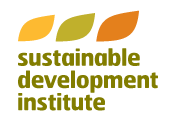Blog
Watch Our Film on the Jogbahn Clan
Watch our film on one Liberian communities' epic struggle against UK palm oil company Equatorial Palm Oil.
[video:http://youtu.be/ufMXhc-h9Tg]
Sign the petition: Stand with the Jogbahn Clan to protect their land!
Stand with the Jogbahn Clan: Tell EPO NO means NO!
On March 5th the Jogbahn Clan, from Grand Bassa County in Liberia, celebrated a major step forward in the struggle to save their land from encroachment by British palm oil company Equatorial Palm Oil PLC (EPO). But, they are now in imminent danger unless we act now to help protect their land.
After months of negotiations and advocacy by community members in Liberia, backed by Friends of the Earth Liberia and international partners, the President of Liberia, Ellen Johnson Sirleaf, promised that the Jogbahn land – just over 20,000 hectares – should be recognised as the community’s land. She said no company should operate there without the community’s consent.
But the company is not listening.
Despite the Presidential statement, EPO is continuing to conduct studies of the Clan's land in preparation for clearance. Land clearance and other preparatory activities would be unlawful, as they do not respect communities’ right to give or withhold their Free Prior and Informed Consent, which is a requirement provided for under both national law and international law.
Silas Kpanan'Ayoung Siakor, campaigner for the Sustainable Development Institute/Friends of the Earth Liberia said: “Equatorial Palm Oil must listen to the Jogbahn Clan and accept that their 'no' means 'no'. The continuing determination of these communities is a cautionary tale for corporations who think they can ignore communities' rights and ownership of land".
Tell the company to listen the community and the government.
[video:http://youtu.be/ufMXhc-h9Tg]
Watch and share the video
Join the conversation on Twitter #stopEPO
Sample Tweets:
Join the Jogbahn Clan in standing up to #landgrab by British #palmoil company #stopEPO. Watch our video + take ACTION bit.ly/1myNa5n
Help stop #landgrabbing for #palmoil in #Liberia, tell #EPO NO means NO! Watch our video and take ACTION bit.ly/1myNa5n #stopEPO
ACT NOW to stop communities land from being grabbed in Liberia by British #palmoil company–sign the petition bit.ly/1myNa5n #stopEPO
To learn more about the Jogbahn Clan's story read our blog and view our photo essay
To hear first hand from the community listen to our radio show
Get more information on this story here
---------------------------------------------------------------------------------------------------------------
PRESS RELEASES
Resistance to Liberia landgrabs a warning to Africa investment conference - May 6th 2014
SDI welcomes President Sirleaf's commitment to protecting Joghban clan’s land from further encroachment by British palm oil company Equatorial Palm Oil - March 6th 2014
UK’s Equatorial Palm Oil accused of human rights abuses in Liberia - December 20th 2013
SDI calls on the Government of Liberia and Equatorial Palm Oil to immediately cease land survey in Grand Bassa, District no.4 - September 25th, 2013
---------------------------------------------------------------------------------------------------------------
PRESS COVERAGE
Small community in Liberia stands strong against land grabbing - Real World Radio, May 6th, 2014
Grand Bassa County celebrate halting of EPO expansion drive - FrontPage Africa, March 6th, 2014
Palm oil producer accused of supporting attacks on Liberian civilians - The Times, December 20th, 2013
The Bitter Taste of Liberia's Palm Oil Plantations - Inter Press Service, May 29th, 2013
---------------------------------------------------------------------------------------------------------------
LANDGRABBING IN LIBERIA
Uncertain Futures: The Impact of Sime Darby on Communities in Liberia - Sustainable Development Institute
Landgrabs in Liberia - Friends of the Earth International
Africa's Vanishing Forests - On Earth Magazine, December 4th, 2013
African farms need help, but the G8’s plan is for landowners, not the poor - The Globe and Mail, July 9th, 2013
European Investments Assist Land Grabs for Palm Oil in Liberia - Sustainable Development Institute/Friends of the Earth Europe, June 24th, 2013
Powering the Transition - D + C Magazine, June 6th, 2013
Landgrabbing in Liberia - Ejolt, May 2013
Liberia's landless people have a lesson for visiting world leaders - The Guardian, February 1st, 2013
The Real Price of Europe Going Green - AfricAvenir, February 5th, 2013
Liberian Communities Affected by Oil Palm Land Deals Gather, Release Statement on Expansion of Sime Darby and Golden Veroleum Plantations - Sustainable Development Institute, Social Entrepreneurs for Sustainable Development and Save My Future Foundation, December 3rd, 2012
Large-scale land grant to Sime Darby to grow oil palm in Liberia threatens the rights of local communities, their food security, and puts their wellbeing at risk - Sustainable Development Institute, September 21st, 2012
When our land is free, we’re all free
Across Africa, corporations are grabbing community land and water - and nowhere more than in Liberia, where half the country has already been allocated to foreign investors. But one community has shown it's possible to overcome intimidation, organise and resist.
May 6th, 2014
by Silas Kpanan'Ayoung Siakor and Jacinta Fay
Right now in Abuja, Nigeria, agribusiness corporations are courting African governments at the Grow Africa Investment Forum to 'further accelerate sustainable agricultural growth in Africa'.
Corporations’ interest in agriculture in Africa has certainly accelerated corporate control of land and seeds but done little to support agriculture that will feed the continent. Rather than support family farming and smallholder agriculture private sector investment in agriculture has resulted in grabbing land from communities; the land which they farm sustainably and rely on for their survival.
Communities are resisting this corporate takeover of their land and they are winning. All over Africa people are sending a clear message to their governments; stop selling Africa to corporations. The Jogbahn Clan in Liberia is one such community and here is their story.
The sense of jubilation in Blayahstown is palpable. People come from surrounding villages to join in the celebrations and the town is filled with singing and dancing.
The Jogbahn Clan is celebrating a victory as the President of Liberia has now recognised their right to say no Equatorial Palm Oil (EPO) a British palm oil company grabbing their land. This is no small feat in a country where over 50% of the land has been given to a corporation without the consent of the communities who customarily own the land.
The sense of accomplishment is not lost on Chief Elder Chio Johnson who looks like he hasn’t stopped smiling since he returned from the Clan’s meeting with the President of Liberia where she committed to support them in protecting their land from being grabbed by EPO. “Why should a company take away our livelihood?” asked Chio, “We come from this land. Everything our ancestors left us is preserved in the forest, so why should we give up our forest?”
Walking through the forest Deyeatee Kardor, the Clan’s Chairlady picks leaves and describes the different medicines that they can be used for. She recounts how she and her family hid in the forest throughout the war and managed to survive on the plants and fruits growing in the bush. Though the land bears the scars of the recent past it also represents the Clan’s ancestral home and they would not willingly allow this deep connection to the land to be fractured.
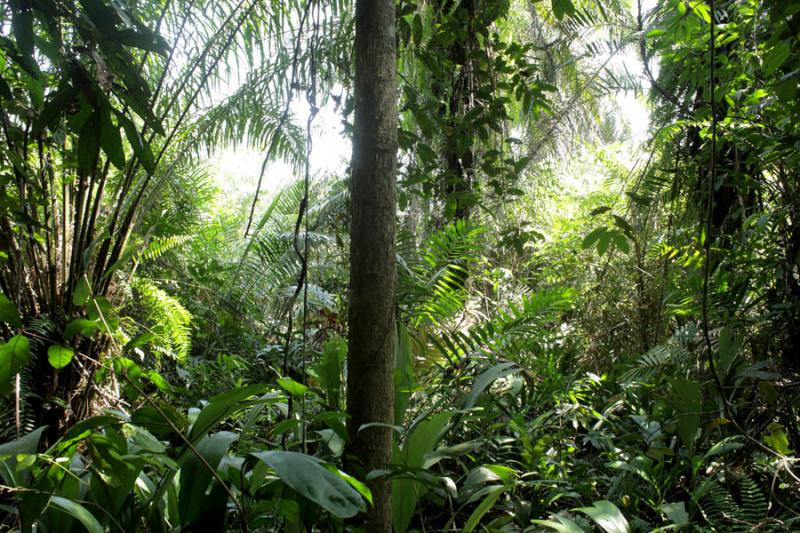
“The land gives us everything” Chio says as he surveys the area; the vegetables, wild palm and sugar cane growing all around. Like other rural communities in Liberia they make their livelihood from the land they manage collectively. The clan are self-sufficient and manage the land sustainably. For the Clan; to lose their land is to lose everything.
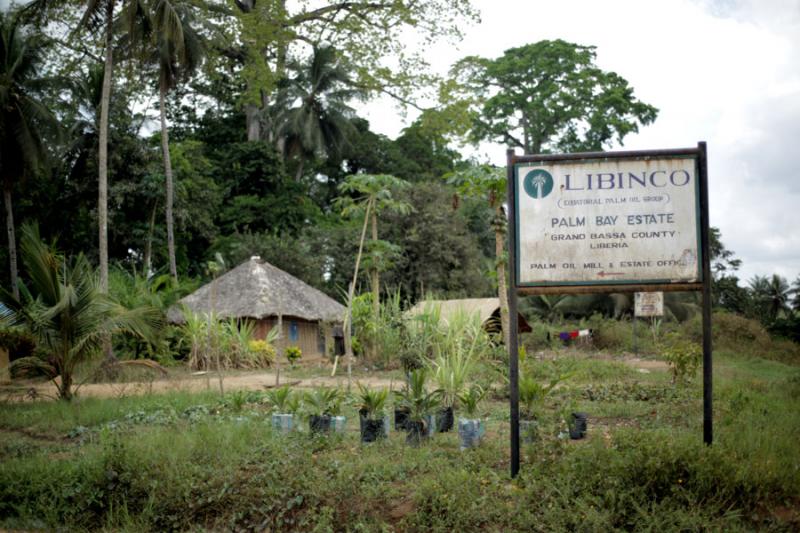
The communities’ resistance began in 2012 when EPO began to expand their plantation onto community land. The Government of Liberia and EPO had signed a concession agreement allowing the company’s plantation to engulf the communities’ land amounting to over 20,000 hectares. Communities all over Liberia are facing the same threat as their lands are given to companies without their consent. As a result conflict between communities and companies has been widespread.
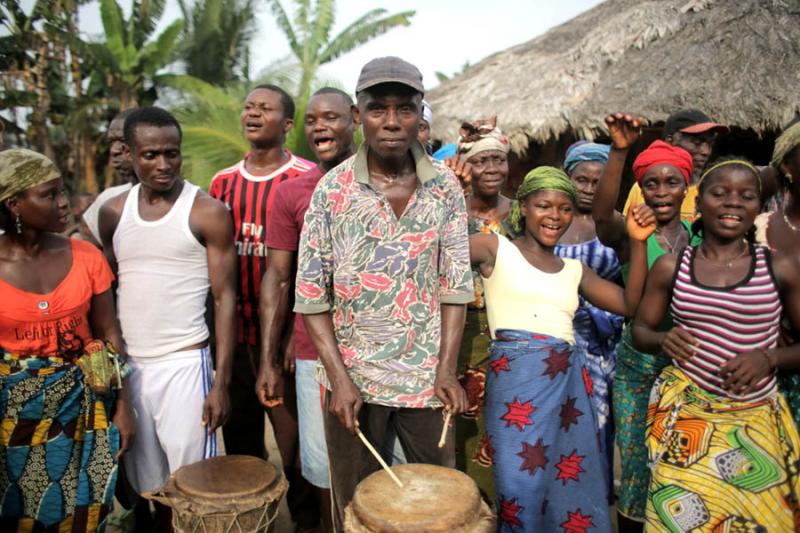
The Clan organised and came together to resist their land being grabbed. Men, women and youth from the 11 affected towns chose representatives to form a core group to lead the resistance. They met the company and the government several times to object to the company’s expansion. In spite of this towards the end of 2012 EPO began clearing and planting their land destroying crops and farmland.
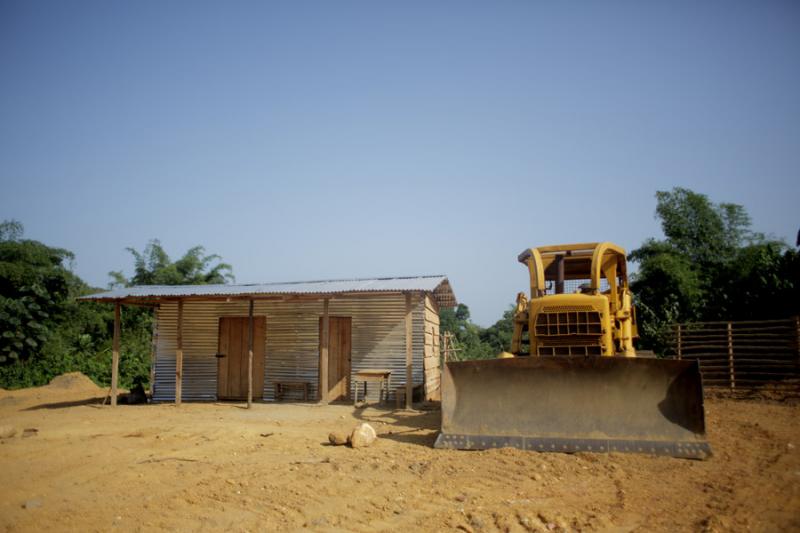
In September 2013 EPO began surveying the communities’ land without their consent. When communities attempted to stop the survey a paramilitary police unit was deployed into the area. People suffered harassment and intimidation by EPO security and the police. They drove through villages at night flashing their emergency lights and arrived in villages riding on top of vehicles the same way rebel fighters did during the war. People were also assaulted during a peaceful march and 17 people suffered arbitrary arrest. The Clan Chief was also suspended from his position by the government because he spoke out against the company.
Despite these aggressive tactics the community continued resisting. They lodged a complaint to the Roundtable on Sustainable Palm Oil (RSPO) and presented a petition to the government stating their objections. “All they have done is try to divide us” commented Deyeatee, “They offer important people a little money to try to convince them”. However the community refused to be weakened by division and eventually secured the crucial meeting with the Liberian President Ellen Johnson Sirleaf where she recognised their right to say ‘no’ to the company.
“The struggle has made us stronger than ever before and we’ve learned a lesson to stay united” said Anthony Johnson, “The success is so great as it secures my future and the future of my children to come. I will stay on this land and plant crops for my children so future generations can live off the land”
Despite the President's commitment EPO has still not recognised that the Clan has said no to their operations. They are operating as if things are business as usual and conducting studies of the Clan’s land in preparation for clearing. Land clearance and other preparatory activities would be unlawful, as they do not respect communities’ right to give or withhold their Free Prior and Informed Consent, which is a requirement provided for under both national law and international law.
But the Clan are not discouraged and they continue their resistance for the hope of a better future; “We want the government to support us to be self-sufficient on our land instead of giving it to a company who will just take the money and go home. Instead we can keep the money in Liberia and we can live better lives” said Garmondeh Benwon (R).
Every year, an area five times the land size of Liberia is grabbed from communities around the world. The Jogbahn Clan show that stopping it is possible when communities stand together, mobilise and resist. The government has recognised their right to say no now EPO and KLK, their majority shareholder, must do the same.
It is a privilege to work in solidarity with the Clan and their drive and resilience has been a constant source of inspiration for everyone in SDI/FoE Liberia. The Clan are preparing to share the lessons of their struggle and give hope to other communities resisting landgrabbing. And as Deyeatee says
“When our land is free, we’re all free”.
[video:http://youtu.be/ufMXhc-h9Tg]
Support the Jogbahn Clan to protect their land and resources, tell EPO NO means NO! Sign the petition!
Join the conversation on Twitter and tell governments and investors that we can #GrowAfrica without landgrabbing.
Sample Tweets
We need to #GrowAfrica without #landgrabbing - sign the petition bit.ly/1myNa5n #GAIF14 @GrowAfricaForum #stopEPO
Communities tell governments-stop selling #Africa to corporations-watch the video! bit.ly/1myNa5n #GAIF14 @GrowAfricaForum #stopEPO
Warning to investors communites are resisting #landgrabbing - bit.ly/1myNa5n #GAIF14 @GrowAfricaForum #stopEPO
Silas Kpanan'Ayoung Siakor is a campaigner on Community Rights and the founder of the Sustainable Development Institute/Friends of the Earth, Liberia a national civil society organisation promoting the sustainable and just use of Liberia’s natural resources. Silas has received the Goldman Environmental Prize in 2006, the Award for Extraordinary Achievement in Environmental and Human Rights Activism from The Alexander Soros Foundation in 2012 and TIME Magazine chose him as one of the 2008 Heroes of the Environment.
Jacinta Fay is a community worker and campaigner for the Community Rights and Corporate Governance Programme of the Sustainable Development Institute/Friends of the Earth Liberia which supports communities protect their land and resources and challenges corporate and government actions which threaten community rights. She is also Landgrab Campaigner for Friends of the Earth International which works to challenge landgrabbing, defend community territories and protect land rights. She also campaigns on trade justice, reproductive rights and social justice issues.
Sustainable Developement Institute P.O. Box 5678, Duarzon Village 1000 Monrovia 10, Liberia | e-mail | p: +231 (0)330 641355 ©2013-2021
